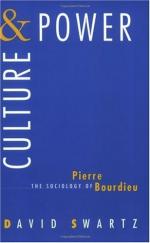|
This section contains 515 words (approx. 2 pages at 300 words per page) |

|
World of Sociology on Pierre Bourdieu
Rare among French cultural theorists of the post-World War II era, Pierre Bourdieu is an empiricist, who bases his complex and challenging theories about 'popular' aesthetics on extensive empirical research. During the 1960s and 1970s, Pierre Bourdieu conducted a series of studies on the way people consume the products of mass culture, focusing on attendance at art museums. In 1979, he published his findings in Distinction: A Social Critique of the Judgement of Taste, arguably his best-known and most influential work. In it, Bourdieu disagreed with the aesthetic theories growing out of the work of nineteenth-century philosopher Immanuel Kant, who believed that the value and quality of works of art could be judged by objective criteria. Instead, Bourdieu argued, cultural and aesthetic tastes were social constructs. The bourgeois pure aesthetic--valuing a detached approach to cultural and artistic products--was, he said, no better and no worse than popular aesthetics, with...
|
This section contains 515 words (approx. 2 pages at 300 words per page) |

|


